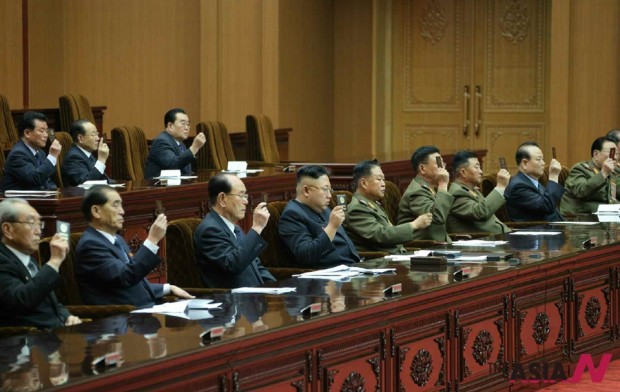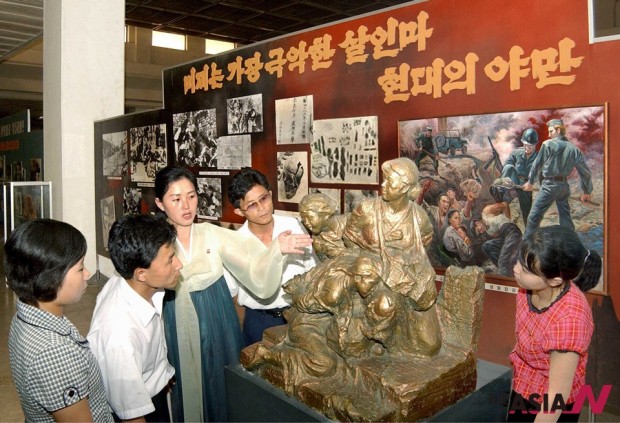Cynicism and alienation growing in North Korea

The North's newspaper, Rodong Sinmun, reported the photo of 1rd session of the 13th Supreme People's Assembly of the Democratic People's Republic of Korea. North Korea said, Kim Jeong-eun was induced into a chairman to the National Assembly Defense Committee of the Democratic People's Republic of Korea, Transfer of power has done peacefully, Thursday 10, April 2014. (Photo : NEWSis)
There are many signs that cynicism and alienation is steadily growing within North Korean society and, especially, lower reaches of its elite. People who recently had opportunities to talk frankly to North Koreans (and I do not mean refugees), including the present author, have noticed that North Koreans are increasingly likely to express feelings of alienation and cynicism in regard to their government and everything it stands for.
This is a relatively new development. Just ten years ago, one could not hear much in the way of political criticism from a North Korean businessman or junior diplomat. At the same time, such gradual ideological disintegration is something one should expect, especially given the experience of the Soviet Union and other ex-communist countries.
When communists took power in the Soviet Union and many other countries, they usually (not always, but usually!) enjoyed a great deal of popularity. It could not be otherwise: communist theory promised a perfect utopian world, free from exploitation, crime and poverty. Such promises were also wrapped in then irresistible scientific jargon and therefore looked persuasive to many.
Communism was initially popular even in nations whose intellectuals decades later came to fancy themselves as being natural born anti-communists – like, say, Poland or Hungary. One can be reminded, for example, that Hungary was one of a few European countries that experienced a spontaneous communist takeover immediately after the First World War, in 1919.
The same is applicable to North Korea, even though communism was in a sense forced on North Koreans by the Soviet military in the late 1940s. Nonetheless, this was not an altogether unwelcome gift. The Soviet-style communist theory was then widely seen as a key to the brilliant future and hence was much embraced by significant numbers of the then tiny Korean intellectual class. Of course, there were people who could not stand communism, but until 1951, they could always leave if they wanted to – and as the massive North-South migration testifies, many of them used this opportunity and moved south, thus making North Korea even more politically homogenous.
Promised era of miracles proved elusive
However, the communist system had one serious and perhaps incurable problem: it simply did not work. The theoretical prescriptions turned out to be highly impractical. Thus, the promised era of economic and technological miracles proved to be very elusive.
To deal with this challenge, the faithful invented a number of tricks. These ideas are often now presented as cunning schemes once created by shameless party ideologues, but this is not necessarily the case. Many radical leftist intellectuals – by that time long a part of the privileged establishment in Moscow, Warsaw, Belgrade and Hanoi – really struggled to understand what had gone wrong and what could be fixed. From the little that is known about North Korea of the 1970s and 1980s, Pyongyang was not an exception, though the unusually high level of repressiveness in the North made people very careful when considering such thorny political issues.
With the passage of time, however, the idealistic revolutionaries were gradually replaced by either pragmatic opportunists or people who, while somewhat idealistic, were less willing to accept the communist dogma in its entirety. When they thought about improving socialism, they were increasingly willing to entertain the idea that the entire Leninist socialist project was wrong, though many second-generation idealists still believed that it could be salvaged somehow. In the Soviet Union and in many other East European countries, this stage was reached in the 1960s, while in North Korea, such changes seemingly happened somewhat later, in the 1980s.

The word 'bourgeois' means 'people of the Capitalist class' in Korea.But it is referred as the exploiting class of capitalist societies, including working class, in North Korea. North Korea which is strongly militant view to the class would deem the bourgeios harmful to its revolution in a negative light. But now the economy concept and system of North Korea is faltering. (Photo : NEWSis)
New generation of NK elite emerging
And then the third generation came. These people weren’t stupid, they wanted to survive politically and so they were prepared to pay the necessary lip service to official dogma. But they no longer believed and in the depths of their heart they understood that for the sake of their country’s future communism would have to be jettisoned somehow. This was indeed done through gradual reform in China and also through the sudden collapse of communism in the USSR and Eastern Europe. This collapse was driven by the third generation people who did not take the official ideology seriously and were looking to the developed West for aspiration or just cared about their own earthly success.
It seems that this gradual transition of power to the third generation is happening in North Korea as well. If anything, they have even more reason to be sceptical: they are increasingly exposed to the successes of neo-capitalist China and South Korea. In the long run, the emergence of this new generation of the North Korean elite might become a real game changer.






















































